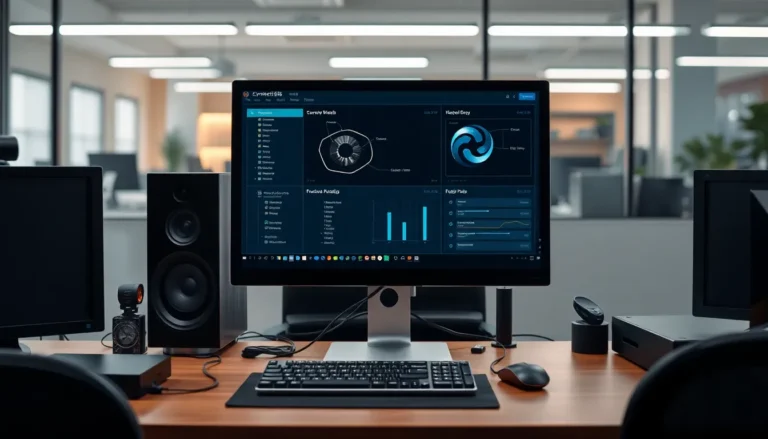Table of Contents
ToggleIn the fast-paced world of tech, DevOps is like the superhero team-up nobody knew they needed. It’s the perfect blend of development and operations that makes software deployment smoother than a fresh jar of peanut butter. But before diving into this dynamic duo, there’s one crucial step: the DevOps login. Think of it as the VIP pass to the coolest party in the tech universe.
Overview of DevOps Login
DevOps login represents a critical gateway for users aiming to access DevOps tools and environments. This login secures various platforms, enabling teams to deploy software efficiently and effectively. Users typically enter credentials to authenticate their identities and gain permissions needed for specific tasks.
Accessing DevOps environments involves various user roles and permissions tailored to enhance collaboration between development and operations. Administrators manage these roles, ensuring that team members receive the appropriate access levels. Each user can interact with configuration settings, integration points, and cloud resources through their authenticated session.
Security plays a vital role in the DevOps login process. Multi-factor authentication adds an additional layer of protection, preventing unauthorized access. Implementing strong password policies further enhances security measures, decreasing the risk of data breaches.
Integration with popular identity management systems improves user experience by allowing single sign-on capabilities. This streamlines the login process, enabling faster access to essential DevOps tools such as CI/CD pipelines and version control systems. By simplifying login procedures, teams can focus on development activities without unnecessary delays.
Auditing login activities provides insights into user behavior and access patterns. Monitoring these activities helps identify suspicious actions or potential security threats. Regular reviews of login logs contribute to maintaining a secure DevOps environment.
DevOps login serves as the foundation of secure access, facilitating collaboration while protecting sensitive resources. Efficient login practices and strong security measures ensure teams can efficiently leverage DevOps methodologies in software development.
Importance of Secure DevOps Login
Secure DevOps login plays a vital role in safeguarding sensitive data and ensuring efficient collaboration within development teams. Implementing robust security measures facilitates a protective environment for all users.
Authentication Methods
Utilizing strong authentication methods significantly enhances security. Multi-factor authentication enables an additional verification layer, requiring users to present something they possess, like a mobile device, alongside their password. Biometric authentication, such as fingerprint or facial recognition, adds further protection by tying access directly to a user’s physical traits. OAuth implementations streamline login processes by allowing secure token-based access, reducing reliance on passwords alone. These diverse approaches reinforce security and make unauthorized access considerably more difficult.
Access Control
Effective access control measures manage user permissions and uphold security. Role-based access control assigns permissions based on the user’s job function, ensuring each individual accesses only necessary information and tools. Administrators evaluate user roles regularly, adjusting permissions to adapt to changing responsibilities. Fine-grained access control offers granular permission settings, allowing for tailored access based on specific data or applications. Regular audits of access rights help to identify and mitigate potential vulnerabilities, reinforcing the integrity of the DevOps environment.
Best Practices for DevOps Login
Secure DevOps login practices are vital for maintaining safety and efficiency in software development. Implementing robust authentication methods ensures sensitive data remains protected.
Implementing Single Sign-On
Single sign-on streamlines user access across multiple applications. By using a single set of credentials, users can access various tools without repetitive logins. This approach enhances user experience and improves productivity. Integrating SSO with identity management systems facilitates seamless authentication, reducing the administrative burden. Moreover, implementing centralized user management allows for easy updates to permissions and roles. Organizations utilizing SSO also benefit from enhanced security and simplified user provisioning.
Using Multi-Factor Authentication
Multi-factor authentication adds a critical layer of protection to the DevOps login process. Relying on multiple verification methods significantly reduces the risk of unauthorized access. Users could be required to enter a password, receive a text message, or utilize biometric verification for successful login. Implementing MFA helps verify user identity even when credentials are compromised. Enforcing this security measure builds trust and confidence within teams and organization stakeholders. Regular education on MFA practices promotes adherence and awareness of security protocols, leading to stronger overall security posture.
Tools and Technologies for DevOps Login
DevOps login relies on various tools and technologies that facilitate secure user access and enhance collaboration. The following sections detail some of the most crucial platforms and integration practices.
Popular DevOps Platforms
Jenkins stands out as a widely used automation server that simplifies continuous integration and delivery processes. GitLab offers integrated tools for version control, CI/CD, and project management in a single application. Additionally, Docker enables developers to package applications into containers, ensuring consistency across environments. Kubernetes manages containerized applications effectively, automating deployment, scaling, and operations. Lastly, Terraform provides infrastructure as code capabilities, allowing teams to manage resources efficiently and securely.
Integrating with Identity Providers
Integrating with identity providers streamlines the login process within a DevOps workflow. LDAP serves as a popular choice for managing user directories, facilitating centralized authentication. SAML enables secure single sign-on, connecting multiple applications seamlessly. Okta, a cloud identity management service, simplifies user access and provides multi-factor authentication for enhanced security. Microsoft Azure Active Directory also plays a vital role in managing identities across cloud applications. These integrations bolster security and improve the user experience, ensuring efficient collaboration among development teams.
Challenges in Managing DevOps Login
Managing DevOps login presents various challenges that can hinder productivity and security. First, ensuring secure access for all users requires balancing convenience and protection. Admins struggle with managing a high volume of user accounts, often leading to inconsistent access control policies.
Next, improper implementation of multi-factor authentication can result in user frustration. Users may find additional verification steps cumbersome, potentially leading to decreased compliance with security protocols. Furthermore, lack of user education about security best practices can exacerbate this issue.
Another challenge lies in integrating identity management systems. Inconsistent setups across applications create confusion, complicating the login process. Developers and operations teams may experience delays in their workflows due to these integration hurdles.
Monitoring login activities also poses difficulties. Without regular audits, recognizing suspicious behavior becomes challenging. This oversight can lead to unauthorized access and security breaches, ultimately threatening sensitive data.
Another factor includes managing various authentication methods. Teams often need to adapt to different systems, making it harder to maintain a cohesive approach to user security. Burdensome password policies may discourage users from following best practices, increasing the risk of weak passwords.
Lastly, role-based access control can complicate user permission management. Poorly defined roles may grant unnecessary access, causing security vulnerabilities. As cooperation among teams evolves, fine-tuning these permissions becomes crucial.
Addressing these challenges helps streamline the DevOps login process, fostering secure collaboration across development teams.
The significance of a secure DevOps login cannot be overstated. It serves as the foundation for effective collaboration and efficient software deployment. By implementing robust authentication methods and access control measures, teams can safeguard sensitive data while enhancing productivity.
Regular audits and education on security protocols further strengthen the integrity of the DevOps environment. As organizations continue to embrace DevOps methodologies, prioritizing secure login practices will be essential for fostering a culture of trust and collaboration. With the right tools and strategies in place, teams can navigate the challenges of managing user access while ensuring a streamlined and secure experience.







